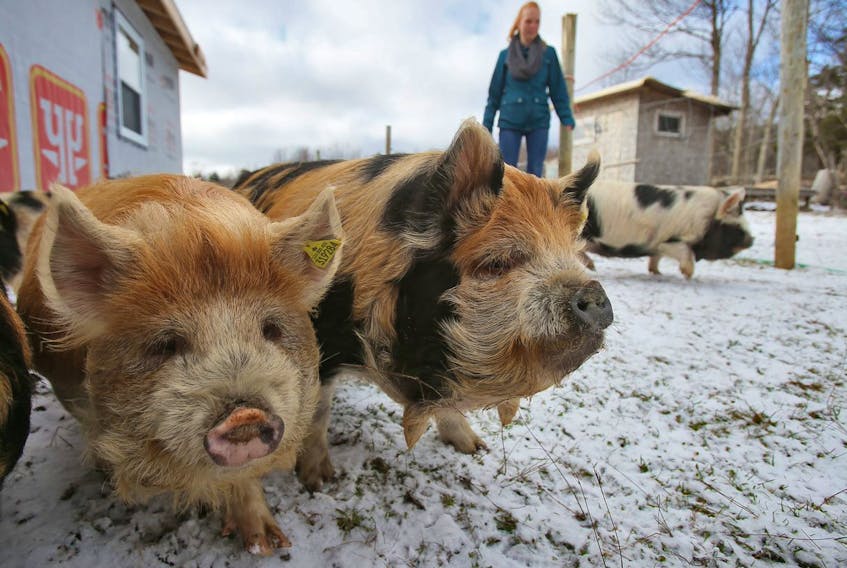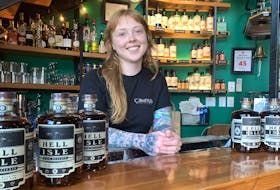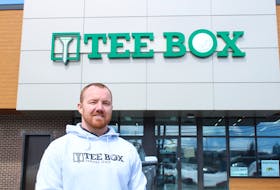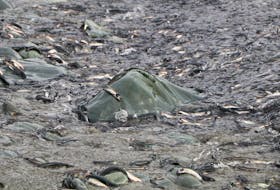GRANVILLE BEACH, N.S. — Past the roadside signs advertising eggs for sale, and pies, and manure ($3/bag) and along one of the smoothest stretches of pavement in Nova Scotia, is where Pauline Haas raises pigs.
If you live in a place as picturesque as Granville Beach, it wouldn’t do to raise just any old hogs, but KuneKune pigs, pronounced CooneyCooney, native to New Zealand and once endangered, are very photogenic.
In November of 2016, Haas and her husband Andre packed three young kids and two dogs in a minivan and drove from B.C. to Nova Scotia, looking all over the province for a place to settle.
They found 10 hectares of land overlooking the Annapolis River that already had a barn. The house needed work but Andre Haas is a carpenter, so no problem there.
And Pauline, who’d wanted to be a farmer since she was a girl, had a plan.
“I already had the pigs bought, I didn’t have them yet, I was just waiting for them,” said Haas, who had put down $4,000 for a breeding pair of KuneKunes and had been waiting for two years for them to arrive.

‘So cute’
She had first gotten interested in the breed when she saw a picture of one.
“I just thought they were so cute, and I was hooked,” she said.
There are 40 pigs on the farm along with a few other animals, and the quacking, clucking and gobbling pretty much drowns out the quiet grunts of the KuneKunes, which aren’t given to much squealing.
The barn that was already on the farm when the Haas family moved in is where sows that are getting ready to give birth are kept, a new barn is home to pigs from six to eight months old, the ones Haas calls teenagers and that are the most rambunctious.
“They’re docile. My kids can go in with a mother that’s in labour and be there while babies are coming,” Haas said of the breed. “You can go in with a male while there’s a female with him, and they’re not going to attack people.”

Grass-fed diet
KuneKune pigs have upturned snouts so they don’t root in the ground. Once mature, they can stay outside day and night in the summer, and Haas feeds them as much grass as possible.
“We’ve kept the typical kinds of pigs, too, and they just destroy everything. But these guys just graze. That’s another thing I like about these guys, they eat significantly less pelleted feed than a typical pig,” said Hass, who buys a custom-made mix, designed by a feed analyst, that consists of barley, a little wheat, ground flax, ground kelp and peas for a protein source. It’s made in New Minas and delivered to the farm in one-tonne totes.
Haas, who has even learned how to make soap from lard, is self-taught as a pig farmer.
“It’s been smooth but emotional,” she said. “You think it’s going to be easy, then you lose an animal — it doesn’t happen often — but you lose one that you put your heart and soul into trying to save and it doesn’t make it. You have to learn things, like needles. I had to learn to give needles, and that was hard. And castrating, we do humane castrating, the vet taught us and we use a sedative and an anaesthetic, so that’s something I had to get around because I’m not good with blood. There’s these aspects of farming where you have to get over it.”
Still in the early stages of running a business, Haas has a product for which the demand outstrips supply. KuneKune meat is more red than traditional pork, mild tasting and nicely marbled with pure white fat.

3,000 pounds of pork
Last year, Haas sold her first 250 pounds of pork in three days at the farmers market. In the fall, 600 more pounds went just as fast and by the coming spring she expects to harvest 3,000 pounds.
“I’ve got nine sows now, I’d like to have 15-20 sows so they’re producing a few litters a month because the demand is there,” said Haas, who has waiting lists for meat and for breeding stock and for 10-week-old castrated males that people want to raise for their own meat.
The pigs that are going to market are weaned at 10 weeks and harvested at between 12-15 months.
“The reason it ranges is because I finish my pork on grass, because I’m taking advantage of them being a grass-fed breed,” she said. “You don’t want to harvest them in January, because why would you go through the trouble of having this breed and not finish them on grass?”
Haas wants to start reaching out to chefs as soon as she has enough product. She’s also striving to maintain a balance between being a mom and running a small business.
“I can tell when a pig is 12 hours away or three hours away from farrowing, giving birth. So when I see those signs, then I pull an all-nighter,” she said. “In the spring, I’ve got to fix fences so that’s a long day. I try to work within the hours that my kids are in school, and then my husband gets home from work and I’ll spend another hour in the barn. But it’s not like dairy farming, where you’re always working.”









